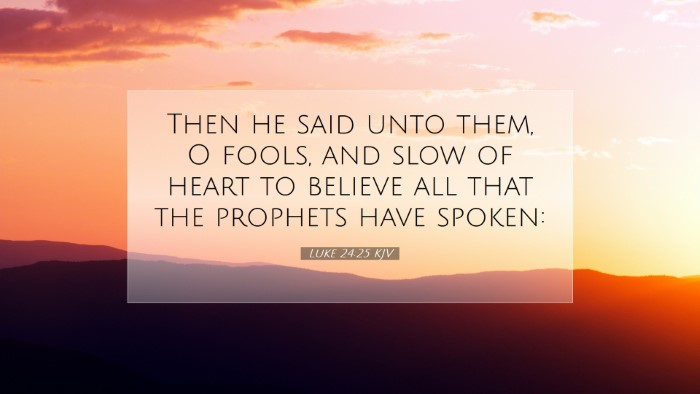Bible Commentary on Luke 24:25
Bible Verse: "Then he said unto them, O fools, and slow of heart to believe all that the prophets have spoken!" (Luke 24:25, KJV)
Contextual Analysis
The passage in Luke 24:25 occurs shortly after the resurrection of Jesus Christ, where He appears to two disciples on the road to Emmaus. This narrative serves as a significant moment, illustrating the disciples' struggle to understand the events surrounding the death and resurrection of Jesus. Their confusion reflects a broader struggle within the Jewish community regarding the expectations of the Messiah, rooted in the prophetic writings.
Commentary Insights
Matthew Henry's Commentary
Matthew Henry points out that Jesus' remark to the disciples highlights their lack of understanding and belief in the Scriptures. He emphasizes that the term "fools" here is indicative not of intellectual deficiency, but of a moral failing — specifically, a failure to accept the truths revealed through Scripture.
Henry elaborates on the concept of being "slow of heart," asserting that this slowness reflects a spiritual sluggishness that keeps one from receiving and acting upon divine truths. By referencing the prophets, Jesus underscores the importance of Scripture in guiding belief and understanding regarding the Messiah's mission.
Albert Barnes' Commentary
Albert Barnes contextualizes this verse by highlighting that the disciples had witnessed profound events but still lacked insight into their significance. Barnes interprets Jesus' address as a rebuke designed to provoke introspection about their disbelief.
He notes that the phrase "slow of heart to believe" pertains to a reluctance not only in understanding but also in responding. Jesus calls them to recognize that the prophets had foretold the very sufferings and glories that they were struggling to comprehend. For Barnes, the call to faith is a call to acknowledge God’s prophetic Word as a pivotal foundation for understanding Christ's redemptive work.
Adam Clarke's Commentary
Adam Clarke takes a nuanced approach, exploring the implications of Jesus’ admonition. He states that this verse illustrates the struggle of human belief in the face of divine revelation. Clarke suggests that the disciples' inability to connect the prophets' predictions with Christ’s achievements demonstrates a common human tendency to miss the divine narrative that unfolds throughout history.
Clarke further elaborates on the significance of Jesus calling them “fools” as a corrective measure, intending not only to reprimand but to enlighten them. He insists that true understanding arises from recognizing God’s overarching plan through prophetic revelation—a theme that resonates deeply in theological discourse.
Theological Implications
This verse highlights vital theological principles regarding faith, understanding of divine revelation, and the relationship between the Old Testament prophecies and the New Testament fulfillment in Christ. The term "fools" serves to remind scholars and theologians alike that even the most devoted followers of Christ can sometimes be blind to his truths, necessitating continual engagement with Scripture.
Application for Pastors and Theologians
- Encouragement to Study Scripture: Pastors should emphasize the importance of immersing their congregations in the entirety of Scripture, not only in parts that affirm their viewpoints.
- Addressing Doubts: The passage serves as a reminder that doubt is a part of the Christian journey. Pastors may find ways to address the tensions between faith and doubt during sermons and discussions.
- Equipping Believers: Within teaching and preaching, it is essential to equip believers with the ability to see Christ in all of Scripture, helping them to connect the dots between Old and New Testament texts.
- Understanding Discipleship: This passage indicates that the journey of faith is also one of learning and growing in understanding. Pastoral ministry should include a nurturing of faith through education and revelation.
Conclusion
In reflecting on Luke 24:25, we recognize the call towards deeper faith and the necessity of understanding the Scriptures. Scholars, students, and pastors alike can find profound truth in the recognition that belief is often a journey, requiring us to align our hearts and minds with God’s revelations through history and prophecy. As we seek to understand our faith, let us not forget the words of Christ encouraging us to believe all that the prophets have spoken.


